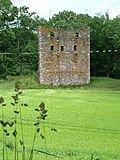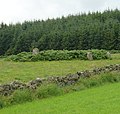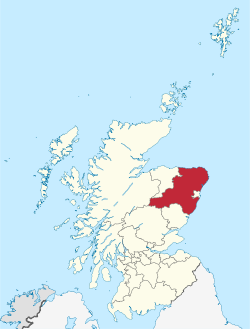| Name | Location | Description | Ref No | Image |
|---|
| Old Parish Church of St Talorgan | Fordyce | Ruined church | SM352 |  |
| Parkhouse Hill stone circle (Aikey Brae) | Old Deer | Recumbent stone circle | SM2 |  |
| Berrybrae stone circle | Crimond, Lonmay | Prehistoric stone circle | SM8 |  |
| Cothiemuir Hill | Keig | Prehistoric stone circle | SM17 |  |
| Broomend henge, standing stones and symbol stone | Port Elphinstone | Prehistoric henge and avenue | SM18 |  |
| Christchurch, stone circle and standing stone, Midmar | Midmar | Recumbent stone circle | SM32 |  |
| Old Keig stone circle | Keig | Recument stone circle | SM40 |  |
| Sunhoney | Midmar | Recumbent stone circle | SM44 |  |
| Whitehill stone circle | Bogmore Wood, Monymusk | Recumbent stone circle | SM55 |  |
| Tap o' Noth | Rhynie | Hill Fort | SM63 |  |
| Ardlair Stone | Kennethmont | Pictish symbol stone | SM65 |  |
| Craw Stane | Rhynie | Class 1 Pictish symbol stone | SM69 |  |
| Kintore symbol stone | Kintore | Pictish symbol stone | SM76 |  |
| Balquhain Castle | Chapel of Garioch | Remains of a tower house | SM90 |  |
| Doune of Invernochty motte | Strathdon | Medieval motte | SM94 |  |
| Hill of Dunnideer, fort, platform settlement and tower | Insch | Prehistoric fort | SM95 |  |
| Inverallochy Castle | Rathen | Ruinous large courtyard castle | SM97 |  |
| Inverugie Castle | Inverugie | 16th-century Tower House | SM98 |  |
| The Bass and Little Bass | Inverurie | Motte-and-bailey castle and earthworks | SM99 |  |
| Boyne Castle | Boyndie | 16th-century quadrangular castle | SM354 |  |
| Eslie stone circle (ESE of Eslie) | Banchory | Recumbent stone circle | SM976 |  |
| Eslie stone circle (South of Eslie) | Banchory | Recumbent stone circle | SM977 |  |
| Nine Stanes (Mulloch Wood) stone circle | Banchory | Recumbent stone circle | SM979 |  |
| Old Bourtreebush stone circle | Banchory-Devenick | Remains of stone circle | SM980 |  |
| Dunnottar Castle | Dunnottar | Ruinous castle | SM986 |  |
| Dundarg Castle | New Aberdour | Traces of prehistoric fort/remains of medieval castle | SM2450 |  |
| Ravenscraig Castle | Peterhead | Ruined 15th-century L-shaped tower-house | SM2496 |  |
| Gight Castle | Fyvie | Ruined 16th-century castle | SM2508 |  |
| Findlater Castle | Sandend | Ruined medieval castle | SM2846 |  |
| Banff Castle | Banff | Traces of medieval castle | SM2927 | |
| Old Slains Castle | Slains | Ruined medieval tower house | SM3250 |  |
| Esslemont Castle | Ellon, Aberdeenshire | Ruined Tower House | SM3400 |  |
| Balquhain stone circle | Chapel of Garioch | Recumbent stone circle | SM3961 |  |
| Balbridie timber hall | Banchory | Site of a Neolithic long house | SM4084 |  |
| Capo long barrow | Fettercairn | Neolithic long burial barrow | SM4444 |  |
| Pittulie Castle | Pitsligo | Ruined 16th/17th-century castle | SM5578 |  |
| Eden Castle | Near Banff | Ruined 16th/17th-century towerhouse | SM5638 |  |
| Conzie Castle (Bognie Castle) | Huntly | Ruined 17th-century house | SM5899 |  |
| Fedderate Castle | New Deer | 15th-century stronghold | SM5951 |  |
| Pitsligo Castle | Pitsligo | 15th/18th-century ruined courtyard castle | SM6146 |  |
| Old Aberdour Kirk | Aberdour, Aberdeenshire | Ruined St Drostran's kirk and graveyard | SM6155 |  |
| Ellon Castle | Ellon | Remains of a late medieval/early modern castle | SM7333 |  |
| Cowie Castle | Cowie | Traces of medieval castle | SM9742 |  |
| Glenkindie House souterrain | Towie | Prehistoric souterrain (underground store) | SM10953 |  |
| Asloun Castle | Alford | Round tower, remains of a larger building | SM11392 |  |
| Corgarff Castle | Corgarff | 16th-century castle | SM90080 |  |
| Cullerlie stone circle | Echt | Prehistoric stone circle | SM90088 |  |
| Culsh souterrain | Tarland | Iron Age souterrain (underground storage chamber) | SM90091 |  |
| East Aquhorthies stone circle | Inverurie | Prehistoric recumbent stone circle | SM90126 |  |
| Glenbuchat Castle | Glenbuchat | Ruined z-plan tower hooooouse | SM90151 |  |
| Huntly Castle | Huntly | Remains of L-plan castle | SM90165 |  |
| Kildrummy Castle | Kildrummy | Remains of medieval castle | SM90181 |  |
| Maiden Stone | Chapel of Garioch | Pictish cross-slab symbol stone | SM90210 |  |
| Picardy Stone | Insch | Class I Pictish symbol stone | SM90239 |  |
|
| St John's Church, Gamrie | Gardenstown | Ruined church and burial ground | SM5678 |  |
| Tolquhon Castle | Tarves | Ruined 15th/16th-century castle | SM90302 |  |
| Tomnaverie stone circle | Coull | Recumbent stone circle | SM90303 |  |
|























































